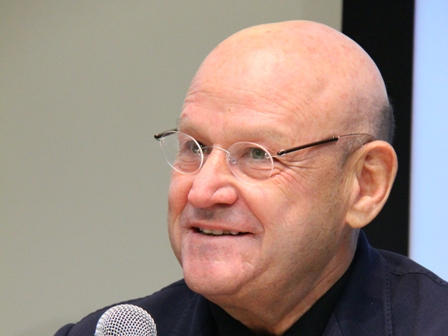Interview with Edward R. Pressman, the President of the International Competition Jury

This year at the 24th Tokyo International Film Festival, the French film “Untouchable” won both the Tokyo Sakura Grand Prix and the Award for Best Actor. The President of the Jury this year, American producer Mr. Edward R. Pressman, was in Tokyo in 1991 (4th TIFF) as the President of Jury for the Young Cinema Competition Section. That year he discovered the young and talented directors Jean-Pierre Jeunet and Marc Caro, whose film Delicatessen won the Gold Award.
Mr. Pressman felt that this year it was “difficult to reach a consensus” yet was confident that “after many hours of heated discussions, we are satisfied with the films we chose for the awards.”
— Did you set any standards for judgment before watching the 15 Competition films?
Edward Pressman (Pressman): I had no preconceptions and I came with an open mind. I was given the liberty to decide how to go about the judging but I did not want to impose my opinions on the other members of the jury. I believed that the screening process should be as democratic as possible.
— Was it difficult to come to an agreement with the other four jury members?
Pressman: There were definitely differences of opinion about some of the awards but that’s because directors, producers, and actresses have different outlooks on films. The balance of factors such as the quality of entertainment and political outlook is crucial when judging films. We had many heated discussions but in the end I am satisfied with the films we chose for the awards.
— Which films were most talked about during the judging session?
Pressman: The three films the juries liked were Untouchable, The Woodsman and the Rain, and Play but Play was unanimous. It was an experimental and adventurous film. However, we all had differences of opinion and it was difficult to reach a consensus.
— Why wasn’t Play chosen for the Grand Prix?
Pressman: Play was cinematically more adventurous but some of the members of the jury thought it was too dark. We couldn’t decide unanimously so we took a vote.
— What was the deciding factor in choosing Untouchable for the Grand Prix?
Pressman: The performances were unforgettable. Omar Sy’s physical presence was magical and François Cluzet having to act only from the neck up was an amazing accomplishment. The film seemed real but in the end had a fable-like quality. The fact that it was based on a real life story gave it significance. It dealt with a serious subject in a very entertaining, inspiring, and hopeful way.
— What was your impression of the Japanese film, The Woodsman and the Rain, which won the Special Jury Prize?
Pressman: It reminded me of a French Film directed by François Truffaut called Day for Night (1973). It is a film about the making of a film which was very interesting for me as a filmmaker. It showed some of the absurdity in the work we do, and the performances were impressive.
— Which film did you like personally?
Pressman: They didn’t get many votes but I liked A Better Life, Trishna, and Detachment. I like the leading actor in Detachment, Adrian Brody but I was in the minority…
— What role does the Competition Section play in a film festival?
Pressman: The Competition Section allows less-commercial films from around the world to be exposed to a wide range of people, and this is what makes it significant. In this sense, the Competition Section serves as a starting point for these films to be screened at theaters and to get more media coverage.
— How was it being back at the Tokyo International Film Festival after 20 years?
Pressman: The overall quality of films was much better, but Delicatessen is a film that I still remember after 20 years. The films that Jean-Pierre Jeunet continues to make are great—I love his work.
— Do you think your experience as President of the Jury has influenced you as a filmmaker?
Pressman: I think I learn as much from bad films as I do from good films. It’s so easy to make a bad film. When you go to a theater, you choose a movie you want to see but as a jury member you are ‘given’ films to watch. But this gives you the opportunity to see films you would never choose to see.
On a critical note, there weren’t many experimental films. From the jury members, I noticed that genre films were not treated with the same respect as other films. This doesn’t mean that the festival shouldn’t show genre films, but unless the genre film is excellent, it’s difficult for it to be highly rated.
Interviewed by Gen Suzuki (Film Journalist)












